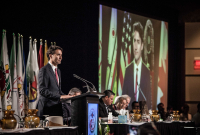Thank you for helping us meet our fundraising goal!
Irish rock star Bono may be a self-declared fan of Justin Trudeau's feminist foreign aid approach, but now his international organization says it is disappointed by the absence of new money to fund it.
A spokeswoman for the ONE Campaign, the global anti-poverty organization that the U2 singer co-founded, tells The Canadian Press that the organization continues to welcome the prime minister's international leadership in putting women and girls at the centre of Canada's aid strategy.
But the lack of new funding for international development is disappointing and falls short of Trudeau's "soaring" feminist rhetoric, ONE spokeswoman Juliet Vedral said in an interview.
Canadian aid agencies say that while the government's retooled feminist foreign aid focus is laudable, it must be accompanied by a funding increase because the reallocation of dollars will only end up draining other worthy aid projects.
The government has been tamping down any expectation of significant new development money in next week's federal budget, say multiple sources.
Louis Belanger, spokesman for Development Minister Marie-Claude Bibeau, had no comment about what might be in next week's budget. When asked about the concerns of the agencies, Belanger said: "NGOs are doing their job. I respect that."
Several organizations are taking issue with Trudeau's high-profile announcement last week of $650 million over three years for sexual and reproductive health projects around the world.
While the money represents a doubling of spending on those gender projects, it comes from the existing development assistance budget — a spending envelope that isn't expected to see a significant increase in the budget.
"We're disappointed in that it's wonderful that Justin Trudeau, like Stephen Harper before him, wants to prioritize girls and women," Vedral said, referring to the former prime minister's maternal and newborn child health initiative.
"What we are more interested in is new money and not taking away from existing programs," she added. "So far, his actions have failed to live up to that soaring rhetoric that he campaigned on."
Vedral said ONE wants to see Canada double its aid budget, saying it then would cost "four cents, per Canadian, per day" as opposed to the existing two cents. Her assessment is a comedown from the adulation Bono heaped on Canada last summer when he appeared at a Montreal conference that raised about US$13 billion in pledges for the Global Fund to fight AIDS, malaria and tuberculosis.
"The world hears you when you say 'poverty is sexist'," Bono said at the event with Trudeau in September. "I'm a fan of Canada."
ONE, along with Canadian organizations, wants the government to announce a long-term plan to reach the United Nations target on development spending of 0.7 per cent of gross national income. Canada's current level is below 0.3 per cent.
Former UN secretary general Ban Ki-moon has called on Canada to come up with a plan to reach the target, something only a handful of countries have achieved.
Bibeau has said it is unrealistic for Canada to reach 0.7 under the current economic conditions.
Lauren Ravon, Oxfam Canada's policy director, said Canada needs to invest more than $800 million a year to get the aid budget on track, but she's not expecting to see anything close to that from Finance Minister Bill Morneau next week.
Ravon suggested the continued lack of funding could hurt Canada's current positive international image, including when it hosts the G7 next year and when it runs for a temporary seat on the UN Security Council in 2019.
"Countries will be looking for signals from Canada," she said. "It's our time to shine. Increased aid helps Canada do that."
Cicely McWilliam, the policy director of Save the Children Canada said it is important the government wants to be a "champion" for helping poor women and girls in the developing world.
"Certainly there's support rhetorically, for girls, that's great. It will be really important for the funding to follow that rhetoric."
Caroline Riseboro, the president of Plan Canada, said the government's new focus on women and girls is significant because it goes further than commitments by previous governments to simply be "gender aware."
Now, she said, the new funding will address the "root causes of inequality" that effect girls and women: allowing them to make choices around their own sexual reproductive health, removing barriers to economic success, and overcoming life-altering discrimination against young girls.
"Our hope is that, over time, the next step will be to potentially increase the amount of funding."





Comments